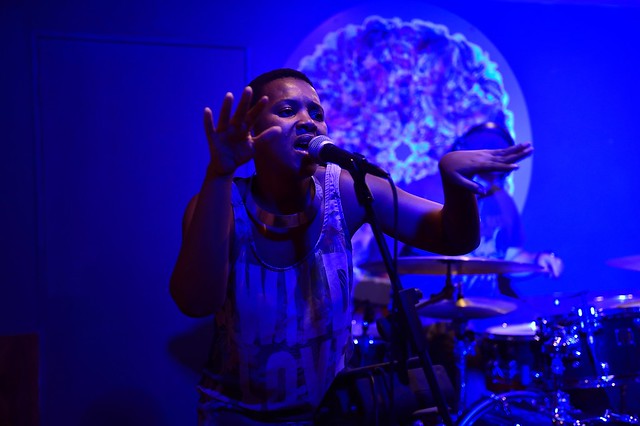
you want to know if i fucked him, don’t you? don’t lie, i know what you journalist types are like—i invite you into my house, i give you water, cool water, which is rare around here, a real commodity, and all you want to ask me is if i fucked the King, if i saw his dick. i didn’t, you know—fuck him, i mean. did i see his dick a couple of times? yes, but those were the times, that was the place. couldn’t go a day without seeing a dick or two, a titty or three. wasn’t anything sexual, that was the beauty of it—the compound was like earth before sin, like the garden from the good book, and that’s what drew the kids in. if you asked the parents, they said it was the booze and the grass, if you asked the government, they said it was the sex, and the rock and roll debauchery, and all that is true, but it wasn’t like that, some all day party, orgies everywhere, that kind of thing. you can get that anywhere, sex and drugs in excess. walk two steps out your house and bam!—sex and drugs. at least in the compound you knew where it was coming from, you had people checking up on you, making sure you didn’t go too far. that’s what drew us in—wasn’t nobody looking out for nobody in Lagos in the seventies. i grew up in the ghetto, real ghetto, sun and sand and hunger, no paved roads, all dead ends, the kind of hopelessness that breeds complete apathy, and apathy is dangerous. you were lucky if you made it past fifteen, not to talk of made it OUT. and if you had a pussy? forget about it. you were lucky if you made it to age ten untouched, and you were real lucky if you didn’t get dragged off in the middle of the night, never to be seen again. nobody talked about it, but we knew what happened to those girls—sold off, most of them, into sex trafficking, play things for European men. how do i know? there’s your first mistake, i don’t know what they tell you people in writer school, but you don’t ask a woman how she knows what a woman does. she just does. not that it matters, but since you wanna know, i’ll tell you—that was almost me. why do you look shocked? that’s what you wanted to know, the truth in all it’s terrible, ugly glory, so there it is. i had five siblings, some of them are even still alive, but at the time it was me and them and my no-good bitch daddy and my no-good enabler mummy, and they weren’t going to support us, so i had to. from eight years old, i sold things—oranges, cigarettes, snails, groundnut, you name it, i hawked it. i used to stand in traffic for hours—it was hot work, terrible awfully hot work, sun beating the skin, beating it bad. one time this white man calls me over, and he’s not in a truck or anything—real nice car, a volvo, i think. it was all german cars back then—i think we thought we were real smart, sticking it to the british. he called me over and asked me if i wanted to make some money. he had an american accent, and at the time, it made me trust him. at the time, we didn’t know that many of the american humanitarians who had come over to help during the civil war had also helped themselves to our humanity. i’ve seen those covers, and they make me sick, they really do. they ate it up, all those sick, dying children with their balloon bellies and their malnourished, jutting joints and their dead-eyed stares covered in flies. put a starving african kid on a magazine cover and everybody loses their mind. oh those poor creatures, barely even humans, like kicked puppies almost. that’s why they run those african aid ads in-between the ones for abused animals–it’s all the same. and then the missionaries come, in droves, fresh out of college packed with narcissism, just ready to piss themselves from the rush of savior complex. fix your face, dear, you’ll catch flies. does the rabbit love the belly of the wolf? i have lived too many years on this Earth to be fooled by that old story. i know the slice of that scythe, i know the things that a person with power can and will do in the name of their own pleasure. of course, i didn’t know all that at the time, of course, i didn’t know much of anything, so when he says you wan make some quick money?, i think, well, yes, who doesn’t want to make quick money, and maybe he’s got these eyes, these steady eyes, trained right on the skin of your left shoulder where the strap of your camisole has slid aside, latching like a leech; and maybe his accent is a bit off and he sounds a bit stupid, but i think of eating one full meal and i let it go. quick money. should have tipped me off, that, the deliberate drag and draw of it, the fat, tasty little morsel at the end of the fisherman’s hook. money, and fast money, at that. the less of it you have, the more the sound of it is like honey to the ears. to the starving cat, even the rotting bird is a delicacy.(are you writing these down? i’m giving you my best material right now, i don’t even know where half of these are coming from—call them nuggets of wisdom from the ancestors, your readers will eat it up). it is uncanny, how easy it is to trust middle-aged white men, even when (especially when?) you know you really, really shouldn’t. i don’t know what it is—something in the eyes, i think, or in the brain, my brain, which had been washed. i got in his volvo. mummy said it was the devil—elders love to blame the devil for the work of man. you strike your wife across the face because she asks you to spend time with the children you wanted her to have? it was satan that guided your hand. you get into a strange mans car because your stomach is so empty it has seemingly begun to digest itself? beelzebub. i’d rather think of it as a brief moment of madness, which i think all people are entitled to in times of trouble. i knew the outcome could be bad, very very bad indeed, but i was young, and i thought i was smarter than dangerous men, which is the way of the young—i was like, okay, if he tries anything i’ll just bite off his thing, and run off with his wallet for good measure. ha! to be young! you think you’re faster, and trickier than death itself, and then death comes—it catches you in its jaws in two bounds, in less than that, and it digs its teeth in deep. there were men in black masks, two men in the back that i had not seen, because they had not wanted me to see, and they took me, and i knew then that i was going to die. i felt then, the kind of fear that seizes you by the bladder and squeezes. i pissed on them, and they startled and struck me, hard, but the momentary distraction proved useful. in the confusion i kicked my legs, kicked and scratched and put up such a fuss and screeched and screeched that i was deemed not worth the trouble, which is rare, very rare, especially these days. they gag the girls now too, bind them tight. i was at a mission in Borno a month ago, maybe two months, and when we found the girls in the tall grasses, forty of the one hundred that did go missing, they were tied up so tight all they could do was wriggle and whimper, all that could move freely was the eyes, the wide blown eyes. at the time i was angry, irrationally angry, because they had not covered the eyes, which i thought was particularly wicked, especially immoral. there is something about the eyes. i thought about not going home, but i did. that’s when mummy said that thing, about the devil doing it. daddy just cut me a look, slurping on his cow tail, slurp slurp slurrrp, running spittle and pepper sauce all over his mouth. yuck. i ran away a couple years after that, when i was 14, and i did it touched, and touched all over, and for the most part without permission, and for the most part quite badly. i didn’t go to school, not even one of those spoon and stone backyard schools, where those with a primary 4 or 5 education could share the wealth of knowledge. i could have, but i preferred to run and kick ball and fight with boys, instead of sitting on an upturned bucket going ah-eh-oh-oo-ay or whatever, and feeling silly. besides that, i was crazy about the King, who was real hot at the time, especially in the slums, where music means something different, takes you somewhere else, anywhere else. i listened to his tapes everyday, man, and when aunty mabel with the tuck shop down the road got a small, ugly, boxy little tv that she turned to football at night for the drunk men to watch while they ate their fufu and sucked on chicken bones, i would sneak off during the day to snatch a look or half a look at King Kuti. the only man i have ever thought was dreamy, almost as dreamy as a woman, in that ugly kind of way. i trust ugly men, when they have sense, which fine men rarely have. Fela had sense. you could hear it when he talked, and he talked, talked smart, talked shit, talked and talked and talked until you got it, and i got it. i think the older we get, the less patience we have for difference. mummy thought he was unruly—she didn’t like his music, which she thought was noise, and daddy didn’t like his politics, which he thought were bullshit. look at him! daddy would say, he thinks he is a white man! it was so ridiculous, at the time, for a black man to speak of justice, so ridiculous that he ceased to be black. i wondered what it meant, then, to be black, and what it meant to be white. i decided that if it was white to want a better tomorrow, for everyone, then i would be white, and i ran away to the compound, or, i got on a bus and walked the rest of the way. i had been told it was a den of sin, the gateway to the bad place. a part of myself kind of believed that. the youngest part. the most terrified. the reality of that place was, in a way, underwhelming. i was a little disappointed in it, like it had cheated me, with its distinct lack of open air orgies. nobody greeted me. people were friendly, but uninterested, or busy with other things, bigger things. the first day was spent idly, wandering; weaving through apartment buildings; nothing impressive, the kind leftover from the queen’s days, and looking like it, old-fashioned and chunky and streaked with discoloration. it was all shockingly normal, the air heavy with hustle and bustle, people hanging up wet laundry on makeshift clotheslines strung across balconies, people playing chess and tuning their radios and drinking fanta in a glass bottle and playing football and braiding hair. chickens ran from children who ran from their mothers who had long stopped chasing them, because who had the time? that surprised me a little, the sight of children, young children, smiling and giggling with a circle on a stick, causing mischief, seeming more or less well-adjusted. i imagined what it would have been like to be a child of the compound, to be born amongst revolutionaries. that was another thing; as the night came, the sky turning from blue to pink to orange to blue again, so did the spark; writers and artists and musicians rose from their beds, and, fully rested at last, did whatever it was that they did best. have you ever heard live jazz play as the night creeps up? you haven’t lived, you really haven’t. i hadn’t lived, up until i heard that horn blow, had myself that first taste of brass like sherbet. sweeter than quick money, and that’s true. good music, real good music, live and in the air, makes you forget why you care about anything in the world, or makes you remember why you do, i can never be sure. that night, i was reborn. i got it, then, why eve bit into that sacred fruit, and why the big man was so ticked off about it–to know, really know, know everything, after knowing nothing at all, that’s a dangerous thing. it does something to you, to know—can’t go back from that. okay, i’ll let you in on a secret—i didn’t see his dick. ha! you should see your face. of course i didn’t see his dick, he wasn’t like that. the worst it got was a couple times in his little briefs, but i guess for some people he might as well have had his dick out, you know? never mind before the british came none of us were all that concerned with nudity. i shouldn’t tell you that, now you’ll think we were on some gentle savage shit, walking around all dumb and naked. some of us did have clothes, obviously, but you get my point—naked is a state of being, neither good nor evil, and the feeling of shame of one’s own nudity is not innate, it is learned…all that long story. born naked, and so on. na so! okay, let me see, what else…no, i never met his wives, but i was close with a lot of the women on the compound. real close to some of them. i learned to read—i knew not to expect true equality, which would require men to give up quite a few benefits, which, i think, will never happen—at least not without a real fight; but, i learned to read. we were a mixed crowd, more or less; a lot of brainy types, newspaper writers who had been laid off for writing about the military coups in no polite terms, college kids who could not finish their education because of all the strikes, striking professors who could not teach their students because they were not being paid a living wage, women who had been cast out of their homes for being too hungry, for wanting to know; but also kids like me, street kids who had nowhere else to go, and labourers who did not want to die starving and crushed under the polished shoes of the greedy. misfits united in our discontent, itching for change, coming together under the blanket of the night sky to roar GOD SAVE THE KING. most of us never met him, but i think we were willing to die for him, for his cause, which was our cause, which we were also more than willing to die for. a lot of us did die, and horribly, particularly the women, who were like tools, their pain a weapon, a dagger to strike down the men, because women could only exist in relation to men, to husbands, to sons. when we lost mama ransome-kuti, the King did not come out from his shrine for three days. there was no music, no drum and brass, as is the custom, no celebration of the natural order of life, and then death—no natural order in an old woman thrown from three stories and left on the ground in unnatural angles, nothing natural about a closed casket. there is something morbid about looking right at a dead body, but i understand it, the finality of it. there is something about looking—it can drive you mad, what you see, what you don’t see. my daddy died when i was twelve, and quite terribly, the kind of sick death that makes your organs pop open like a blueberry in a saucepan. the kind of sick death that cooks you good and long first before letting you rest. i was traumatized by it, his death. no, don’t be sorry, he really was a fresh bastard. it was more the death than the his, if you know what i’m saying. traditionally, death is meant to be a celebration of life, and you’re not supposed to mourn, actually mourn, which, i think, perfectly exemplifies why i hate tradition…you don’t have to look at the body, of course, no-one is forcing you–but the point is you’re supposed to, it’s unsaid, and if you don’t do it…i get in line with the rest of the mourners, of which there were not many, but a good turn-out, enough people for some really good crying, some old-fashioned public weeping. there’s something about a dead body, right before time has a chance to really get in there and do all sorts of wonderful and awful things to it. i wouldn’t say he looked at rest—he had the kind of scowl that never moves an inch—and god bless the embalmer, but the man didn’t clean up very well. you’re meant to be dressed in your best clothes when you die, in this case a ratty red t-shirt, faded past hope, some tatty jeans; tattier sandals. i only had a second to look him right in his face, which i hadn’t been allowed to do as a child, because i was a girl, and girls kept their heads down and their mouths shut. to be honest, i thought about spitting on him, and i think i would have too, if only i had more time. i guess i’m glad that i didn’t, i guess. i didn’t cry either, not like i did when people died on the compound or disappeared or got hurt real bad by police, and not at all like when the King died. that day, you couldn’t tell me that someone hadn’t put out the sun like snuffing a candle. you couldn’t tell me it wasn’t grey skies and shaking earth and thunder and chaos, absolute madness in the land of men and gods. when i say i wept, i mean i wept. real weeping, the way it’s supposed to be done, snot and tears like a dam bursting, beating the ground with your fists like it did something to you. i could have killed somebody. i thought i would, as the whispers rose, the rumours of what it was that had really killed King Kuti. it was Uche, i think, who had never been that bright, PhD and all, that first dared to utter that word out loud, and smear his bullshit all over the hand that had plucked him from the monotony of hopelessness. i gave him a good knock, right on the middle of his shiny little forehead, and had to be held back so i wouldn’t do worse. he was under the impression that Fela had brought it on himself by not cracking down hard enough on all the degenerates that had infiltrated this, the band of revolutionary men and some women, who i suppose to him were on thin ice. i knew what he meant when he said degenerates. i could have killed him, i really could have.
About the Writer:
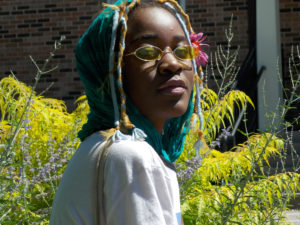 Pei Koroye was born in Lagos, Nigeria in 1998 and currently schools in the US. Pei is a writer, a visual artist, and an anxious lover.
Pei Koroye was born in Lagos, Nigeria in 1998 and currently schools in the US. Pei is a writer, a visual artist, and an anxious lover.


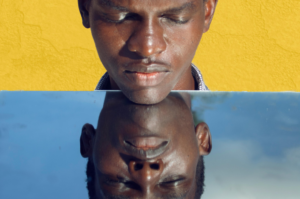

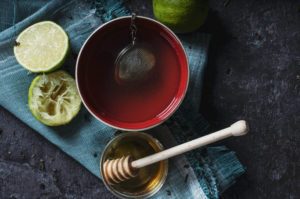

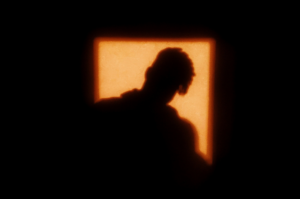
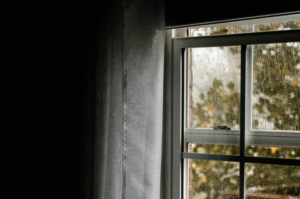

Uzoma April 18, 2019 22:09
I cannot believe how good, how captivating this is to read. Well done!